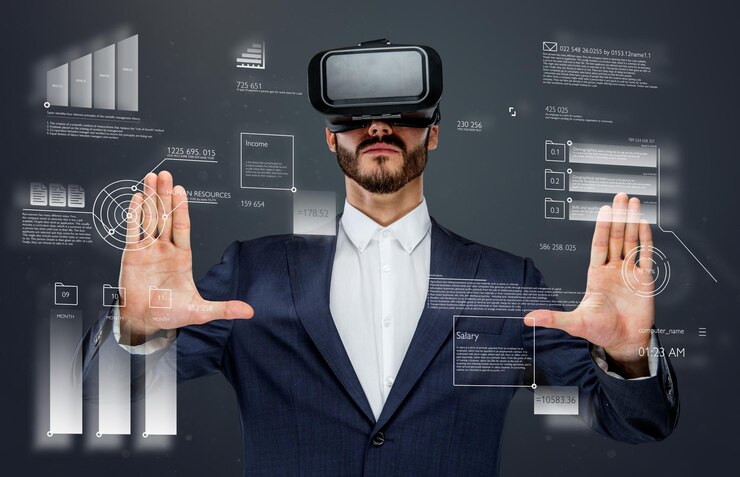From science fiction, the idea of the Metaverse Technology has developed into a rapidly expanding digital reality. Marketers face a new frontier as the Metaverse, defined as a collective virtual shared space formed by the confluence of virtually augmented physical reality and physically persistent virtual worlds, comes into existence. This piece explores the potential and difficulties of marketing in the Metaverse Technology and offers advice on how companies might function in this ever-changing environment.

The Rise of the Metaverse Technology
What is the Metaverse Technology ?
A unified digital environment that people may access using a variety of augmented reality (AR) and virtual reality (VR) technologies is known as the Metaverse. It creates an immersive experience where users may interact in real time with a digital environment by fusing the digital and physical worlds. The emergence of platforms like Meta (formerly Facebook), Decentraland, and The Sandbox, which provide large virtual areas for gaming, socializing, and business, has given rise to the idea.

Market Statistics and Growth
The market for Metaverse Technologies is expanding quickly. In 2023, the worldwide Metaverse market was estimated to be worth $61.8 billion, and from 2024 to 2030, it is expected to rise at a compound annual growth rate (CAGR) of 39.4%, according to a Grand View Research analysis. The need for immersive digital experiences as well as rising investments in VR and AR technology are the main drivers of this rise.

Opportunities for Marketing in the Metaverse

1. Enhanced Customer Engagement
The possibility of improved client engagement is one of the Metaverse’s most important opportunities. The Metaverse Technology offers an immersive experience that is sometimes absent from traditional digital marketing techniques. Brands have the ability to design engaging experiences in virtual environments that draw users in and strengthen their bonds. For instance, companies such as Gucci and Nike have already made their way into the Metaverse Technology by setting up virtual shops where customers can browse and buy digital products. These online retailers provide a distinctive shopping experience that surpasses what can be found in actual storefronts.
2. Innovative Advertising Formats
New forms of advertising are introduced by the Metaverse Technology that are not feasible in conventional digital contexts. Companies can utilize virtual reality (VR) and augmented reality (AR) to make interactive advertisements that draw viewers in. Branded virtual events, virtual product placements, and interactive billboards, for example, can greatly increase brand remember and visibility. In the next five years, 56% of marketers anticipate that AR and VR will be essential components of their advertising campaigns, per an eMarketer report. This is a reflection of the rising understanding of how the Metaverse Technology might revolutionize advertising.
3. Targeted Audience Segmentation
Based on user behavior and preferences, the Metaverse Technology enables the segmentation of an extremely focused audience. In contrast to traditional digital marketing, which may be restricted in its targeting due to data protection rules, the Metaverse Technology provides more detailed information about how users engage with virtual settings. Brands may monitor, for example, how consumers engage with products, navigate virtual areas, and take part in virtual events. With the use of this information, marketers may develop highly targeted and pertinent marketing campaigns that appeal to particular consumer segments.
4. New Revenue Streams
The Metaverse Technology offers prospects for generating more income via the commercialization of virtual goods and services. Virtual apparel, accessories, and real estate are examples of the kind of digital goods that are growing in popularity. A Bloomberg analysis projects that the virtual goods market would grow to $190 billion by 2027. By providing unique virtual goods or experiences that appeal to their target market, brands can profit from this trend. For instance, video game firms can sell in-game products that improve the user experience, and luxury fashion manufacturers can design virtual garment lines that are only available for a limited time.
Challenges of Marketing in the Metaverse Technology

1. Privacy and Data Security
Ensuring data security and privacy in the Metaverse Technology is one of the main problems. Concerns of data breaches and misuse are raised by the gathering and processing of user data in virtual environments. Cybersecurity Ventures estimates that by 2025, cybercrime would have cost the world economy $10.5 trillion yearly. Data protection must be given top priority by marketers, and they must abide by laws like the California Consumer Privacy Act (CCPA) and the General Data Protection Regulation (GDPR). Establishing strong security protocols and open data standards is crucial for fostering user trust in the Metaverse.
2. Technological Limitations
The efficiency of marketing in the Metaverse Technology can still be impacted by technical constraints, even with the rapid growth of VR and AR technologies. User experience can be impacted by problems including excessive latency, restricted platform interoperability, and the requirement for high-performance technology. For instance, a user’s device and internet connection can have a major impact on the quality of virtual environments. It is imperative for brands to guarantee that their virtual experiences are available to a wide audience and optimized for several platforms.
3. Regulatory and Ethical Considerations
The Metaverse’s regulatory environment is still developing, and marketers have a complicated array of moral and legal issues to manage. It is crucial to take into account matters like content filtering, virtual currency legislation, and intellectual property rights. A Deloitte survey states that 78% of CEOs think regulatory obstacles will be a significant deterrent to the adoption of the Metaverse. Marketers need to stay up to date on regulatory changes and make sure that their operations adhere to all applicable legal and ethical requirements.
4. User Adoption and Engagement
Even though the Metaverse Technology offers a lot of intriguing possibilities, user engagement and adoption are still in their early stages. It’s possible that many people are not familiar with virtual environments or do not have access to the required equipment. 34% of internet users reported using VR devices in 2023, according to a Statista poll. This suggests that although acceptance is increasing, a sizeable section of the population is still not utilizing Metaverse Technology. When creating their Metaverse marketing plans, brands need to take these things into account and strive to make the Metaverse Technology more accessible and conscious.
Strategies for Successful Metaverse Marketing

1. Create Immersive Experiences
In order to thrive in the Metaverse, brands need to concentrate on developing captivating and absorbing experiences. This includes creating engaging virtual worlds, organizing online gatherings, and providing one-of-a-kind digital goods. The objective is to develop unique experiences that connect with consumers and motivate them to engage with the brand.
2. Leverage Data Analytics
When it comes to optimizing Metaverse marketing strategy, data analytics are essential. Data may be used by brands to understand consumer behavior, preferences, and engagement trends. Marketing efforts may be improved, content can be personalized, and user experience can be enhanced overall with the use of this data.
3. Foster Community Engagement
Long-term success in the Metaverse Technology depends on developing a robust community. It is recommended that brands prioritize cultivating constructive relationships, supporting content created by users, and taking part in online events. Having meaningful interactions with users fosters a sense of community and brand loyalty.
4. Stay Agile and Innovative
Because the Metaverse Technology is a dynamic environment, marketers need to be flexible and creative in order to stay ahead of the curve. This entails testing out novel technology, investigating hot trends, and modifying tactics in response to customer input and industry advancements.
Conclusion
Marketers have intriguing new potential to engage with targeted audiences, develop immersive experiences, and investigate new revenue streams in the Metaverse. It does, however, also bring with it issues with user acceptance, privacy, technology, and legislation. In order to fully realize the potential of the Metaverse, brands must employ inventive techniques and be up to date on industry advancements.
Stay ahead with the latest tech trends, tutorials, and innovation at InnovatTechie.co – connect with us for exclusive updates! Get In Touch


3 Comments
Howdy! Do you know if they make any plugins to help with SEO?
I’m trying to get my site to rank for some targeted keywords
but I’m not seeing very good results. If you know of any please share.
Appreciate it! I saw similar art here: Bij nl
I have send you an email for further improvement of you website. Thanks.
Even the seemingly utilitarian El Camino car-pickup could possibly be ordered with an SS possibility.